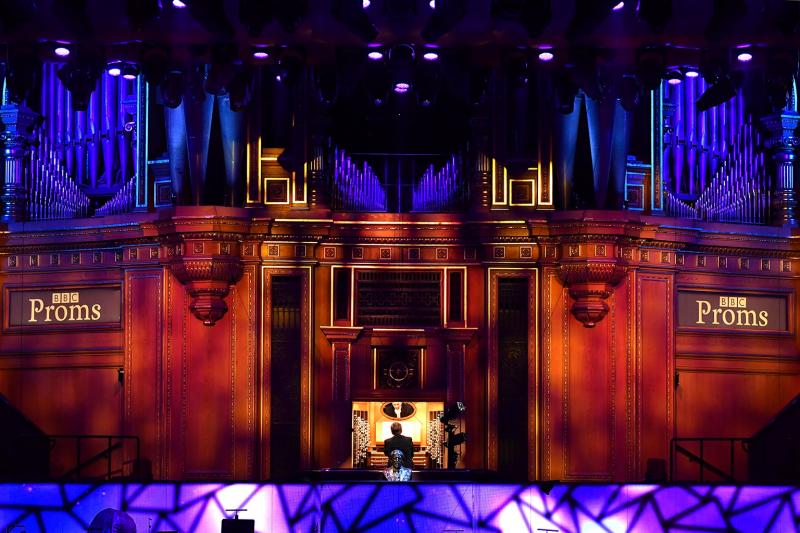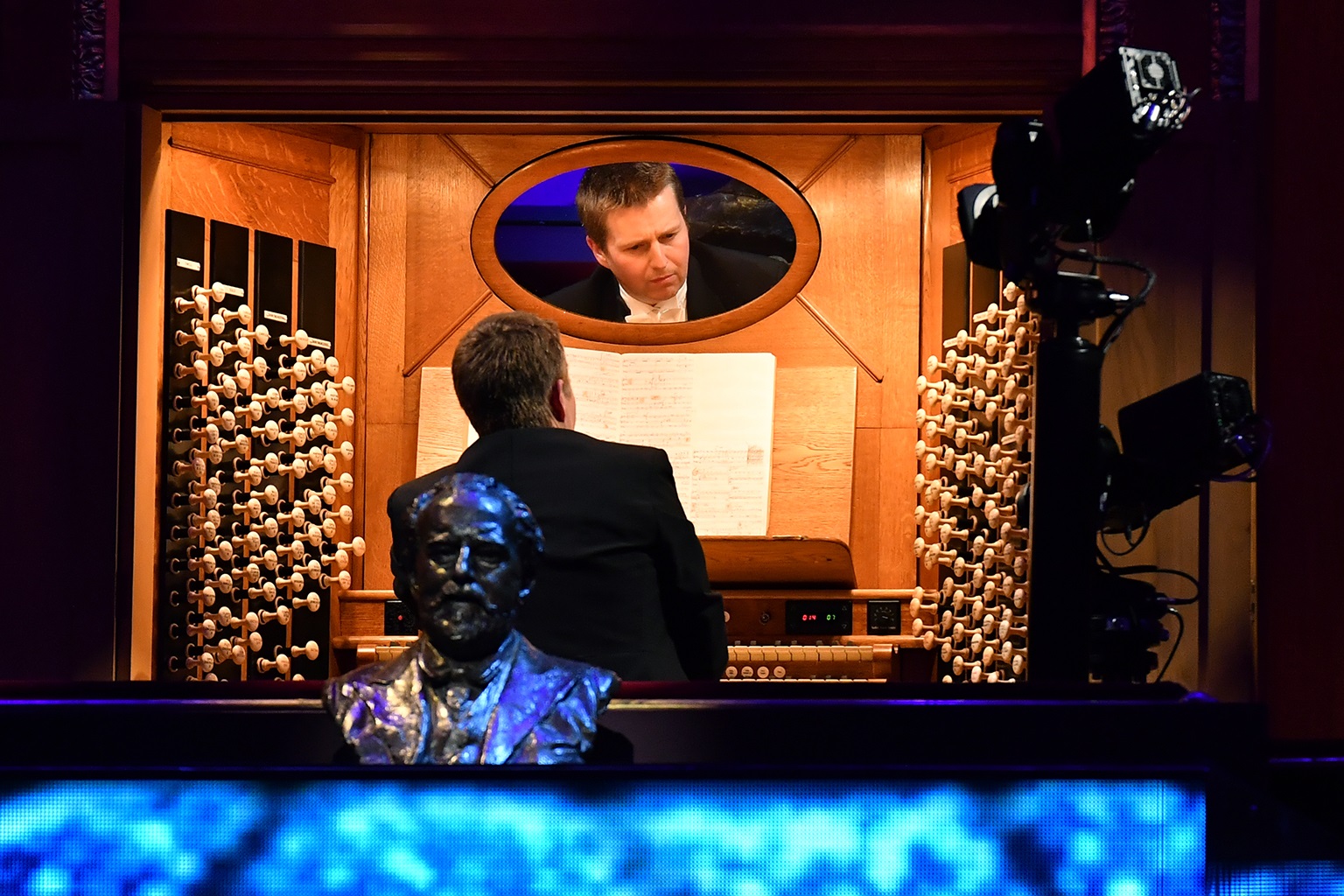BBC Proms live online: Jonathan Scott review - the organ as orchestra | reviews, news & interviews
BBC Proms live online: Jonathan Scott review - the organ as orchestra
BBC Proms live online: Jonathan Scott review - the organ as orchestra
We may not feel the vibrations at home, but nimble camerawork enriches the experience

“Did you bring any Bach?” was not a question to ask of Jonathan Scott before he launched into his jaw-dropping Prom on the Royal Albert Hall's 1871 Henry Willis organ – the largest in the world at the time. augmented in its 2002-4 overhaul to 9,999 pipes.
Circumstantial swings and roundabouts in this fairground turn were plentiful: what you lost from not being there to hear the hall shake and reverberate you gained from the nifty camerawork on hands and feet. In personable conversation with presented Georgia Mann, Scott (pictured below with the bust of Heny Wood) told us he’d spent between midnight and 4am preparing the stops so that he didn’t have to pull them out in the performance, and that we would witness all four consoles/keyboards in operation at once – fingers of each hand sustaining chords, thumbs playing the melody.  All of which would have been rewarding in itself, but there was more than just gimmickry and gimcrackery in the substance. It started with three atonal blurps to represent the incantatory side-drum of Rossini’s Overture to The Thieving Magpie before the funfair lits got under way. The Intermezzo from Mascagni’s Cavelleria rusticana sounded a bit too lugubrious; the organ can’t really stand in for singing violins. But there was wacky brilliance in what Scott unleashed on Dukas’s The Sorcerer’s Appentice, the opening washes sounding more like the outer reaches of Holst’s The Planets, the romp of Goethe’s (and later Disney’s) out of control objects just holding water, the climactic incantation before the quiet ending overwhelming. Preferable to the original, as Mann asserted? No, but illuminating in parts, and always entertaining.
All of which would have been rewarding in itself, but there was more than just gimmickry and gimcrackery in the substance. It started with three atonal blurps to represent the incantatory side-drum of Rossini’s Overture to The Thieving Magpie before the funfair lits got under way. The Intermezzo from Mascagni’s Cavelleria rusticana sounded a bit too lugubrious; the organ can’t really stand in for singing violins. But there was wacky brilliance in what Scott unleashed on Dukas’s The Sorcerer’s Appentice, the opening washes sounding more like the outer reaches of Holst’s The Planets, the romp of Goethe’s (and later Disney’s) out of control objects just holding water, the climactic incantation before the quiet ending overwhelming. Preferable to the original, as Mann asserted? No, but illuminating in parts, and always entertaining.  If there’s a drawback of transcriptions for organ, it’s that the pieces somehow feel rather longer than the originals, and that was especially true of Saint-Saëns’ Third (“Organ”) Symphony. But then doesn’t everyone get impatient to reach the finale’s high jinks even in the original, where the actual organ role is nothing like as virtuosic as the orchestral demands? Scott seemed to leave no stop unpulled (in advance, that is), and then after all that had to talk again, seemingly unflappable, as the results were announced of the people’s choice for encore. No surprises for guessing which of the three was preferred: Elgar’s “Nimrod” from the "Enigma" Variations held sway over the “Largo al factotum” of Rossini's Figaro and Tchaikovsky’s Sleeping Beauty Waltz. At least in one of his loveliest inspirations - a tribute to a German (A J Jaeger) based on music by a German (the slow movement of Beethoven’s “Pathétique” Sonata) - Elgar never had to contend with inappropriate words for nationalists to shout about.
If there’s a drawback of transcriptions for organ, it’s that the pieces somehow feel rather longer than the originals, and that was especially true of Saint-Saëns’ Third (“Organ”) Symphony. But then doesn’t everyone get impatient to reach the finale’s high jinks even in the original, where the actual organ role is nothing like as virtuosic as the orchestral demands? Scott seemed to leave no stop unpulled (in advance, that is), and then after all that had to talk again, seemingly unflappable, as the results were announced of the people’s choice for encore. No surprises for guessing which of the three was preferred: Elgar’s “Nimrod” from the "Enigma" Variations held sway over the “Largo al factotum” of Rossini's Figaro and Tchaikovsky’s Sleeping Beauty Waltz. At least in one of his loveliest inspirations - a tribute to a German (A J Jaeger) based on music by a German (the slow movement of Beethoven’s “Pathétique” Sonata) - Elgar never had to contend with inappropriate words for nationalists to shout about.
- Watch this concert on the BBC iPlayer and/or listen on BBC Radio 3 for the next month
- Full programme of livestreamed BBC Proms here
- More classical music reviews on theartsdesk
rating
Explore topics
Share this article
The future of Arts Journalism
You can stop theartsdesk.com closing!
We urgently need financing to survive. Our fundraising drive has thus far raised £49,000 but we need to reach £100,000 or we will be forced to close. Please contribute here: https://gofund.me/c3f6033d
And if you can forward this information to anyone who might assist, we’d be grateful.

Subscribe to theartsdesk.com
Thank you for continuing to read our work on theartsdesk.com. For unlimited access to every article in its entirety, including our archive of more than 15,000 pieces, we're asking for £5 per month or £40 per year. We feel it's a very good deal, and hope you do too.
To take a subscription now simply click here.
And if you're looking for that extra gift for a friend or family member, why not treat them to a theartsdesk.com gift subscription?
more Classical music
 BBC Proms: Faust, Gewandhausorchester Leipzig, Nelsons review - grace, then grandeur
A great fiddler lightens a dense orchestral palette
BBC Proms: Faust, Gewandhausorchester Leipzig, Nelsons review - grace, then grandeur
A great fiddler lightens a dense orchestral palette
 BBC Proms: Jansen, Royal Concertgebouw Orchestra, Mäkelä review - confirming a phenomenon
Second Prom of a great orchestra and chief conductor in waiting never puts a foot wrong
BBC Proms: Jansen, Royal Concertgebouw Orchestra, Mäkelä review - confirming a phenomenon
Second Prom of a great orchestra and chief conductor in waiting never puts a foot wrong
 BBC Proms: Royal Concertgebouw Orchestra, Mäkelä review - defiantly introverted Mahler 5 gives food for thought
Chief Conductor in Waiting has supple, nuanced chemistry with a great orchestra
BBC Proms: Royal Concertgebouw Orchestra, Mäkelä review - defiantly introverted Mahler 5 gives food for thought
Chief Conductor in Waiting has supple, nuanced chemistry with a great orchestra
 Dunedin Consort, Butt / D’Angelo, Muñoz, Edinburgh International Festival 2025 review - tedious Handel, directionless song recital
Ho-hum 'comic' cantata, and a song recital needing more than a beautiful voice
Dunedin Consort, Butt / D’Angelo, Muñoz, Edinburgh International Festival 2025 review - tedious Handel, directionless song recital
Ho-hum 'comic' cantata, and a song recital needing more than a beautiful voice
 Classical CDs: Dungeons, microtones and psychic distress
This year's big anniversary celebrated with a pair of boxes, plus clarinets, pianos and sacred music
Classical CDs: Dungeons, microtones and psychic distress
This year's big anniversary celebrated with a pair of boxes, plus clarinets, pianos and sacred music
 BBC Proms: Liu, Philharmonia, Rouvali review - fine-tuned Tchaikovsky epic
Sounds perfectly finessed in a colourful cornucopia
BBC Proms: Liu, Philharmonia, Rouvali review - fine-tuned Tchaikovsky epic
Sounds perfectly finessed in a colourful cornucopia
 BBC Proms: Suor Angelica, LSO, Pappano review - earthly passion, heavenly grief
A Sister to remember blesses Puccini's convent tragedy
BBC Proms: Suor Angelica, LSO, Pappano review - earthly passion, heavenly grief
A Sister to remember blesses Puccini's convent tragedy
 BBC Proms: A Mass of Life, BBCSO, Elder review - a subtle guide to Delius's Nietzschean masterpiece
Mark Elder held back from blasting the audience with a wall of sound
BBC Proms: A Mass of Life, BBCSO, Elder review - a subtle guide to Delius's Nietzschean masterpiece
Mark Elder held back from blasting the audience with a wall of sound
 BBC Proms: Le Concert Spirituel, Niquet review - super-sized polyphonic rarities
Monumental works don't quite make for monumental sounds in the Royal Albert Hall
BBC Proms: Le Concert Spirituel, Niquet review - super-sized polyphonic rarities
Monumental works don't quite make for monumental sounds in the Royal Albert Hall
 Frang, Romaniw, Liverman, LSO, Pappano, Edinburgh International Festival 2025 review - sunlight, salt spray, Sea Symphony
Full force of the midday sea in the Usher Hall, thanks to the best captain at the helm
Frang, Romaniw, Liverman, LSO, Pappano, Edinburgh International Festival 2025 review - sunlight, salt spray, Sea Symphony
Full force of the midday sea in the Usher Hall, thanks to the best captain at the helm
 Elschenbroich, Grynyuk / Fibonacci Quartet, Edinburgh International Festival 2025 review - mahogany Brahms and explosive Janáček
String partnerships demonstrate brilliant listening as well as first rate playing
Elschenbroich, Grynyuk / Fibonacci Quartet, Edinburgh International Festival 2025 review - mahogany Brahms and explosive Janáček
String partnerships demonstrate brilliant listening as well as first rate playing
 BBC Proms: Akhmetshina, LPO, Gardner review - liquid luxuries
First-class service on an ocean-going programme
BBC Proms: Akhmetshina, LPO, Gardner review - liquid luxuries
First-class service on an ocean-going programme

Add comment